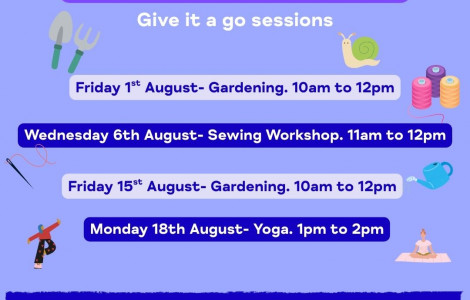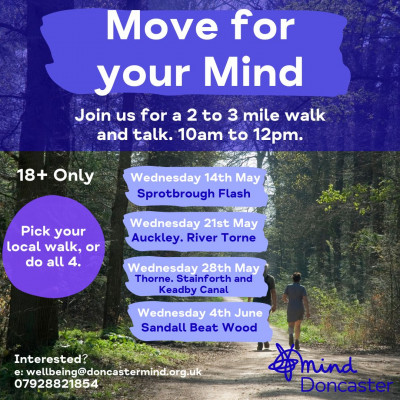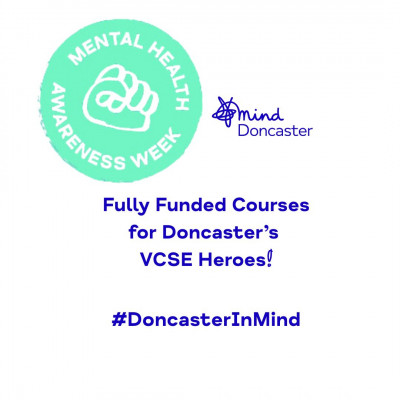1st August 2025 - 18th August 2025, 12:00
Posted: 6th October 2021
Day 4 - #Couragetotalk - Thursday - With you in Mind!

Welcome to Day 4 of the “With You in Mind” Campaign to celebrate World Mental Health Day!
Today is #CouragetoTalkThursday and we are going to focus on having the courage to talk it may be that you don’t know how to start those initial conversations:
- maybe you feel unwell but don’t know where to start
- maybe you know someone who is struggling but not sure how to approach it or what to say.
The information below will give you some ideas of how to handle these difficult conversations whether it is with a family member, friends or colleagues.
Courage to Talk! 
Asking for help for yourself
Seeking help is not always easy. It takes time and courage. It is a big step, and often the first step towards getting and staying well. Remember that you are not alone, and you deserve help and support. When you feel ready, there are plenty of resources to turn to. We have put together some that may help you get started.
How to ask for help
-
Decide who you feel most comfortable talking to. It could be family and friends, professionals or support groups, etc.
-
You could use an agreed signal for trusted others in the household to approach you e.g. an object, glitter, write a note etc.
-
Think about what outcomes you would like to achieve: to just be listened to, or to receive practical or emotional support?
-
Practise what you would like to say; what you are finding difficult and what you would like at this time.
-
Don’t make assumptions, ask for clarity or to repeat
-
Practise ‘self-care’
-
Ensure you have time after the conversation to look after yourself
-
Allow breaks, silence
Who can I turn to
-
GP – First port of call when you are feeling unwell
-
Friends, family, carers and neighbours
-
Research what is available to you locally, for example trained therapists, support groups, community mental health programmes, etc.
-
Anonymous helplines. For example: Mind Helplines - https://www.mind.org.uk/information-support/helplines/
-
Maybe you could ask someone to be a trusted social support
What can a trusted social support do
-
help you to find information
-
discuss your options with you
-
come with you to appointments
-
help out with everyday tasks
-
give encouragement and support.
If you feel ready then you can contact us and refer to yourself to our services. We have included a leaflet detailing some of the services we provide.
Doncaster Mind General leaflet - Sept 21
How to support someone you’re worried about
However it could be that you are looking at how you can support someone else. If someone has disclosed to you how they are feeling or you are concerned that someone isn’t coping, it may be difficult at first to know how to respond. Remember, you don’t need to do anything for them, or try to fix it, rather, be with them and let them explain.
When speaking to someone it is best to:
-
Paying full attention to the other person, using eye contact
-
Consider where best it might be to have a conversation – in safe, quiet environment
-
Remove distractions such as your phone
-
Allow silence and pauses. This gives time to process what they are saying and be mindful of your responses, as well as giving the other person time to try and articulate their thoughts and feelings.
-
Avoid giving advice, your own personal experiences, judgments or opinions on what they are bringing to you.
-
Answers that require a yes or no response can shut down a conversation; ask open ended questions that give the opportunity to elaborate e.g. How do you feel about it now?
-
Repeating back what they have said to you, it allows people to feel you have truly heard what they wanted you to from their perspective.
-
Encourage them if appropriate to seek professional support whether this is GP, Talking Shop or Doncaster Mind.
-
Remember to agree to check in with them again
-
However, if you are concerned and you think someone is at immediate risk, call the emergency service on 999.
Remember you can also give the person our contact details, share our leaflets or website with them for further support. You may feel that sharing some of the information we have sent you over the past few days might help and you could suggest that they look at this.
Additional Training?
If you find the above helpful but feel you want to learn more, maybe consider our Mental Health First Aid Course which is an accredited course to support you when supporting someone else. If you want to find out more on this course, please see our website: https://www.doncastermind.org.uk/training/courses-available/ Discounts available to groups.
We hope you find these helpful, please feel free to share this information with your family, friends and colleagues and maybe next time those difficult conversations arise you will be better equipped at handling them.
As always make sure you look after your own wellbeing when supporting someone else!
If you have any questions please feel free to contact us.




